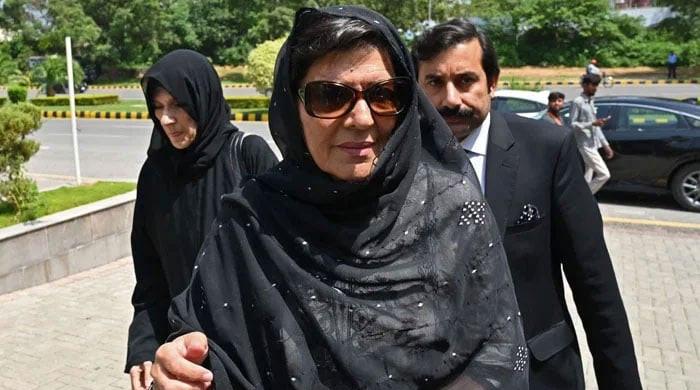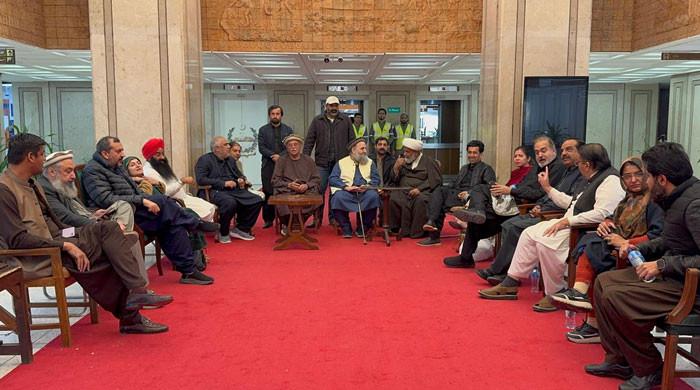SC outlaws denial of dowry or maintenance to women over infertility
Apex court slams "weaponisation" of inferitility against women, imposes heavy fine
July 24, 2025

- Infertility no ground to deny women dower or maintenance, rules SC.
- Court calls out husband for challenging wife's womanhood.
- SC slaps Rs500,000 fine on husband over his conduct.
ISLAMABAD: In a landmark decision, the Supreme Court of Pakistan on Wednesday declared the denial of dowry or maintenance to a woman on the grounds of infertility illegal.
The apex court delivered a scathing condemnation of the "sorrowful" practice of using infertility, or even the suspicion of it, as a weapon against women in legal proceedings.
The ruling was delivered by Chief Justice Yahya Afridi, who, while heading a two-judge bench, lamented that this "social practice routinely results in courts of law becoming venues for humiliating a woman under the guise of litigation."
The remarks came during the hearing of a petition filed by Saleh Muhammad against a Peshawar High Court (PHC) judgment from March 3, 2025, concerning dower claims, dowry articles, and maintenance of his estranged wife, Mehnaz Begum.
"This court cannot but record in the strongest possible terms its disapproval of the manner in which the respondent – a woman already abandoned, denied maintenance, and left to the mercy of litigation – was subjected to repeated, invasive, and demeaning scrutiny of her very personhood at the behest of a frivolous and cruel defence," said the order.
Detailing the respondent's ordeal, the apex court had highlighted that after their marriage in 2006, Mehnaz was subjected to physical abuse by Saleh, and she was abandoned by him at her parental home in 2007.
Saleh then went abroad, cut off all communication, and refused to provide maintenance. Three years later, he remarried and now has two children with his second wife.
Left with no other choice after being denied her rights to dowry and maintenance by Saleh, Mehnaz initiated legal proceedings in 2015 to recover her dower, dowry articles, and maintenance.
However, instead of offering a credible defence, the petitioner — her husband — launched a distressing campaign, alleging his first wife was "medically unfit for conjugal duties or to bear children," thereby questioning her "status as a 'female' under the law." These claims were ultimately refuted by medical tests.
The SC noted its "troubling concern" over how this "allegation, targeting the identity of the respondent" was pursued "persistently and aggressively through three tiers of judicial scrutiny."
The court highlighted that this subjected Mehnaz to "profound personal humiliation," especially since all forums had already refuted the husband's baseless claims.
In the seven-page order, the judges unequivocally asserted that "infertility, even if present, was no ground to deny a woman her dower or maintenance" and it was "certainly no ground to challenge her womanhood."
The order further stressed that "to convert such personal pain into a legal weapon is not only an abuse of the process, but an affront to human dignity that should not be enabled." It also invoked religious and cultural values, reminding litigants that the marital bond is a "sacred covenant" and that the ideals of protection, mutual respect, and dignity in marriage must not be compromised in any event."
"Lest we forget: women in our society constitute a vulnerable group, whose dignity requires vigilant protection and care," the order observed, emphasising the judiciary's role.
The two-member bench underscored that courts could not, and would not, "be passive venues for the perpetuation of social prejudices that harm women and subject them to one trauma after the other."
The order added that it is a "constitutional and moral obligation" to safeguard the personal dignity of all who appear before the courts, "particularly where the power imbalance between the parties is so manifest."
The court found that the petitioner not only "wasted judicial time" but also "caused a woman already in a position of vulnerability to suffer degradation and personal trauma over the course of protracted litigation in three forums spread over a decade."
Consequently, the SC dismissed Saleh's petition and imposed a Rs500,000 fine, which is payable to Mehnaz and serves as a "strong disapproval for the petitioner's conduct".
Furthermore, the judges expressed hope that this order would serve as a "reminder to all litigants and counsel that the dignity of every individual, particularly of women, must be respected in all judicial proceedings," reiterating that "frivolous allegations attacking the personal identity and dignity of a woman will not be countenanced in any court of law."











